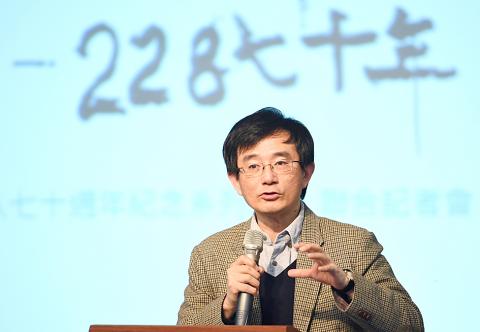The Ill-gotten Party Assets Settlement Committee’s measures to seize illicit Chinese Nationalist Party (KMT) assets would fulfill the long-standing wishes of 228 Incident victims, representatives of victims’ families said yesterday.
Speaking at a news conference, the representatives also expressed their support for the government’s efforts toward transitional justice.
“We have been compensated, but the entire nation had to pay for it, not the perpetrators,” Taiwan 228 Incident Care Association director-general Pan Hsin-hsing (潘信行) said, adding that seizure of KMT assets by the committee would cover the costs of compensation.

Photo: Liu Hsin-de, Taipei Times
“The committee’s moves to handle the issue are exactly what we filed for years ago, but failed to attain,” he said, referring to a suit brought by victims’ families to have the KMT pay compensation.
Committee Chairman Wellington Koo (顧立雄) had served as a pro bono lawyer for the families in the suit, he said, adding that the families have no legal connection with the committee.
The government-funded 228 Memorial Foundation has provided more than NT$7.2 billion (US$234 million at the current exchange rate) in compensation to more than 9,900 victims and family members in connection with the Incident, which refers to the crackdown launched by the then-KMT regime against civilian demonstrations following an incident in Taipei on Feb. 27, 1947. The event also marked the beginning of the White Terror era, which saw thousands of Taiwanese arrested, imprisoned and executed.
This year’s commemoration has drawn attention, as it is the first since President Tsai Ing-wen (蔡英文) took office, even as legislature aimed at attaining transitional justice waits at the Legislative Yuan.
Foundation chairman Hsueh Hua-yuan (薛化元) called for the government to take immediate action to preserve documents related to the Incident.
“We have to find a way to overcome the issue of how and whether to present personally identifiable information when publishing the documents, but what I am more concerned about is that many documents are difficult to find because they are not explicitly labeled as being connected with the Incident,” he said, calling for a halt to the destruction of any government document while the transitional justice process is under way.
“The highest compensation was paid to victims in Changhua County, because police tracking records and name lists were found, but Kaohsiung, Keelung, Taipei and Chiayi were all more serious. However, no such complete documentation has been found there,” he said, adding that important documents might be destroyed unless academics are given rights to review them.
Pan also said that a foundation report assigning responsibility for the Incident to Chiang Kai-shek (蔣介石) should be recognized by the government.
“We are glad that the true face behind the incident has come to light, but the government has yet to recognize the report as an official conclusion,” he said, adding that official recognition would provide legal grounds for changing curriculum guidelines and removing Chiang’s statute from the National Chiang Kai-shek Memorial Hall in Taipei.
“All the evidence points to Chiang being responsible for the Incident, so he should have to pay a price,” he said, adding that the slow pace of transitional justice was “understandable.”

Alain Robert, known as the "French Spider-Man," praised Alex Honnold as exceptionally well-prepared after the US climber completed a free solo ascent of Taipei 101 yesterday. Robert said Honnold's ascent of the 508m-tall skyscraper in just more than one-and-a-half hours without using safety ropes or equipment was a remarkable achievement. "This is my life," he said in an interview conducted in French, adding that he liked the feeling of being "on the edge of danger." The 63-year-old Frenchman climbed Taipei 101 using ropes in December 2004, taking about four hours to reach the top. On a one-to-10 scale of difficulty, Robert said Taipei 101

Nipah virus infection is to be officially listed as a category 5 notifiable infectious disease in Taiwan in March, while clinical treatment guidelines are being formulated, the Centers for Disease Control (CDC) said yesterday. With Nipah infections being reported in other countries and considering its relatively high fatality rate, the centers on Jan. 16 announced that it would be listed as a notifiable infectious disease to bolster the nation’s systematic early warning system and increase public awareness, the CDC said. Bangladesh reported four fatal cases last year in separate districts, with three linked to raw date palm sap consumption, CDC Epidemic Intelligence

Two Taiwanese prosecutors were questioned by Chinese security personnel at their hotel during a trip to China’s Henan Province this month, the Mainland Affairs Council (MAC) said yesterday. The officers had personal information on the prosecutors, including “when they were assigned to their posts, their work locations and job titles,” MAC Deputy Minister and spokesman Liang Wen-chieh (梁文傑) said. On top of asking about their agencies and positions, the officers also questioned the prosecutors about the Cross-Strait Joint Crime-Fighting and Judicial Mutual Assistance Agreement, a pact that serves as the framework for Taiwan-China cooperation on combating crime and providing judicial assistance, Liang

US climber Alex Honnold left Taiwan this morning a day after completing a free-solo ascent of Taipei 101, a feat that drew cheers from onlookers and gained widespread international attention. Honnold yesterday scaled the 101-story skyscraper without a rope or safety harness. The climb — the highest urban free-solo ascent ever attempted — took just more than 90 minutes and was streamed live on Netflix. It was covered by major international news outlets including CNN, the New York Times, the Guardian and the Wall Street Journal. As Honnold prepared to leave Taiwan today, he attracted a crowd when he and his wife, Sanni,